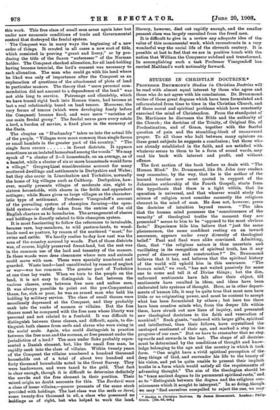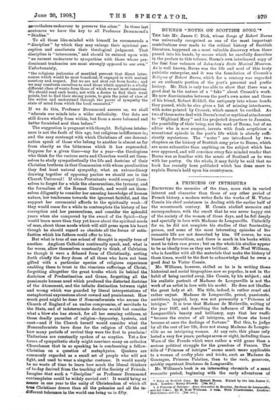STUDIES IN CHRISTIAN DOCTRINE.*
PROFESSOR DRUMMOND'S Studies in Christian Doctrine will: be read with almost equal interest by those who agree and those who do not agree with his conclusions. Dr. Drummond, writes of those great dogmas which have been formulated and. reformulated from time to time in the Christian Church, and. of those moral and spiritual problems which have constantly exercised the mind of Christendom. From the standpoint of Dr. Martineau he discusses the Bible and the authority of the Church ; the doctrine of the Trinity, of Original Sin, of . Predestination, and of Grace, together with the fearful question of pain and the stumbling-block of unanswered prayer. To all those who halt between many opinions on these great subjects he suggests a conclusion; but those who•. are already established in the faith, and are satisfied with whatever seems to them to be a form of sound words, may read his book with interest and profit, and without. offence.
The first section of the book before us deals with "The Human Mind." Dr. Drummond, like St. John (our readers may remember, by the way, that he is the author of the learned treatise now most quoted in support of the_ Johannine authorship of the Fourth Gospel), starts from the hypothesis that there is a light within, that its operation is universal, and that whoever would study the- science of religion must consider earnestly the religious- element in the mind of man. He does not, however, press the doctrine of intuition beyond reason. " The idea. that the human mind possesses the ` consciousness of the- veracity' of theological truths the moment they are- presented " seems to him to be " opposed to the most obvious facts." Experience bids him believe that "just the same- phenomenon, the same confident resting on an inward: assurance, appears under every diversity of theological belief." Paul and Saul were alike convinced. Admitting,. then, that " the religious nature is thus uncertain and vacillating in its recognition of spiritual truth, has it any powei of discovery and construction ? " Dr. Drummond. believes that it has, and believes that the spiritual history of the world will uphold him in this assurance. " The human mind," we read, " has not waited passively for some one to come and tell it of Divine things ; but the dim,. unformed sentiments have felt after their object, till sentiments have resulted in ideas, and ideas have been, elaborated into systems of thought. Here, as in other depart- ments of human life, it may be quite true that most men have• little or no originating power, and mast be content to accept what has been formulated by others ; but here too there have been creative minds who, from the deeper life within. them, have struck out new lines of inquiry, and presented! new theological doctrines to the faith and veneration of mankind." Such giants, "endowed with larger gifts, spiritual and intellectual, than their fellows, have crystallised the- unshaped sentiment of their age, and marked a step in the, progress of our race." But we have to remember that no step. -upwards and onwards is the last. The shape of all doctrine• must be determined by the conditions of thought and know- ledge belonging to the age and the country in which it took: form. " One might have a vivid spiritual perception of the. deep things of God, and surrender his life to the beauty of his vision, and yet be quite unable to present their implicit truths in a form which would satisfy all the requirements of advancing thought." The aim of the theologian should be, to "trace ancient dogma to its permanent spiritual roots," and, so to " distinguish between the dogma and the religious con•. sciousness which it sought to interpret." In so doing, though, we may "find ourselves compelled to reject the one, we may- * Studies in Christian Doctrina, By James Drummond. London Philip. Green. [10e. 6d. net.J
nevertheless endeavour to preserve the other." In these last
=sentences we have the key to all Professor Drummond's 'Studies."
To all those like-minded with himself he recommends a 4' discipline" by which they may enlarge their spiritual per- ception and ameliorate their theological judgment. That discipline is "intercourse," and should be entered upon with
an earnest endeavour to sympathise with those whose pre- -dominant tendencies are moat strongly opposed to our own." Unfortunately,
"the religious jealousies of mankind prevent that direct inter- course which would be most beneficial, if engaged in with mutual courtesy and respect. But we are not shut out from books ; and we may constrain ourselves to read those which appeal to a wholly .different class of wants from those of which we are most conscious. We should read such books, not with a desire to find their weak points, but to find their strong points, to gain the point of view of the writer and understand through the power of sympathy the state of mind from which the book emanated."
If we do this, Professor Drummond assures us, we shall " educate our minds into a wider catholicity. Our data are still drawn wholly from within, but from a more balanced and better furnished soul than before."
The suggestion is pregnant with thought. Religious intoler- ance is not the fault of this age, but religious indifference is ; and the easy contempt with which Christians of one denomi- nation speak of those who belong to another is almost as far from charity as the bitterness which it has superseded. Suppose for a given time—say for a year—the theologians who think for the various sects and Churches would set them- selves to study sympathetically the life and doctrine of their Christian brethren in that Communion with whose peculiarities they feel least natural sympathy, what an extraordinary drawing together of opposing parties we should see in the Church Universal! If ultra-Protestants would compel them- selves to forget for a while the obscurantism, the tyranny, and the formalism of the Roman Church, and would set them- selves diligently to consider her amazing knowledge of human nature, her tenderness towards the ignorant faithful, and the support her ceremonial affords to the spiritually weak—if they would cease for a while to contemplate the history of her corruption and her persecutions, and consider the splendid years when she conquered by the sword of the Spirit—they would learn more than they yet know about the spiritual needs of man, about those needs which will still press upon his heart though he should regard as obsolete all the forms of satis- faction which his fathers could offer to him.
But what is true of one school of thought is equally true of another. Anglican Catholics continually speak, and, what is
far worse, allow themselves constantly to think, of -Calvinism as though it were a debased form of Christianity, setting forth chiefly the fiery doom of all those who have not been gifted with a particular species of religious experience enabling them to trust in the, vicarious sufferings of Christ, forgetting altogether the great truths which lie behind the
doctrines of Predestination and Grace, forgetting all the passionate human need which produced the distorted doctrine of the Atonement, and the infinite distinction between right and wrong which was guarded by literal interpretations of metaphorical expressions about reward and punishment. How much good might be done if Nonconformists who accuse the Church of England of an undue compromise, of servitude to the State, and of indeterminate doctrine would but consider what a blow she has struck, for all her seeming coldness, at those deadly parasites of religion—hypocrisy, hysteria, and cant—and if the Church herself would consider what the Nonconformists have done for the religion of Christ and bow many periods of revival they were the first to proclaim!
• -Unitarians are constantly spoken of as sceptics. Yet a few
lours of sympathetic study might convince many an orthodox Churchman that in so speaking be is condemning a fellow- Christian on a question of metaphysics. Quakers are commonly regarded as a small set of people who will not fight, and used to wear a singular costume. It would surely be no waste or time to learn how much the liberal thinkers of to-day derived from the teaching of the Society of Friends.
Imagine that such a "discipline" as Professor Drummond
contemplates could be widely carried out! It would bring us nearer in one year to the unity of Christendom of which all true Christians dream than all the polemics and all the in- ..different tolerance in the woad can'bring us in fifty.











































 Previous page
Previous page